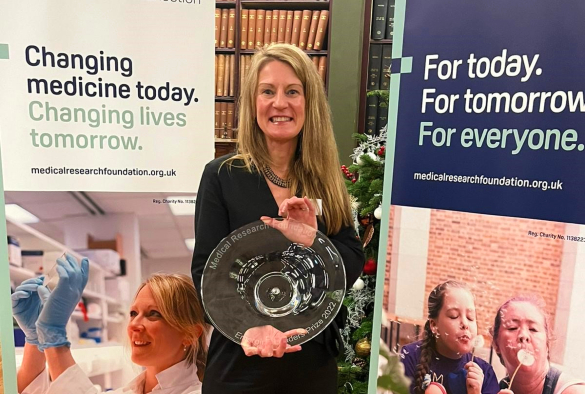
Dr Eve Smith has been recognised as a future leader in the field of lupus research for her work on childhood lupus.
Dr Smith, an NIHR Clinical Lecturer in the University’s Institute of Life Course and Medical Sciences, was announced joint first prize winner in the Medical Research Foundation’s sixth ‘Emerging Leaders Prize’ at an awards ceremony in London on 29 November.
Up to 50,000 people in the UK are thought to have lupus, a complex, long-term illness that can cause damage to the skin, organs, joints or any other part of the human body. Dr Smith’s research focuses on lupus in children, which is more severe than adult-onset lupus. It has greater disease activity, frequent, early occurrence of permanent organ damage, and higher death rates.
Dr Smith leads the ‘TARGET LUPUS’ research programme, which aims to develop and test a new ‘treat to target’ (T2T) approach for childhood lupus to help control disease activity and improve health-related quality of life.
As part of the University’s Experimental Arthritis Treatment Centre for Children (EATC4Children), Dr Smith leads an ‘International cSLE T2T Task Force’ of experts from all over the world. The Task Force, which also includes three young people with cSLE and a parent, recently came together in person in Liverpool to discuss and agree methods for a future cSLE T2T clinical trial.
Dr Smith will use the prize money of £100,000 to directly support the work of the Task Force, accelerating progress towards the development of a cSLE T2T clinical trial.
Dr Angela Hind, Chief Executive of the Medical Research Foundation, said: “Lupus is poorly understood, difficult to diagnose and treat, and there is no full cure – all of which leaves a huge unmet need for new research. We’re excited to be supporting the next generation of leaders in lupus research, as a tribute to Dr Erina Herrick, a scientist who lived with lupus for most of her life. Sometimes our donors specify areas of research important to them, and this was the case with Erina, who left a gift in her Will to support emerging research leaders in the field of lupus.”